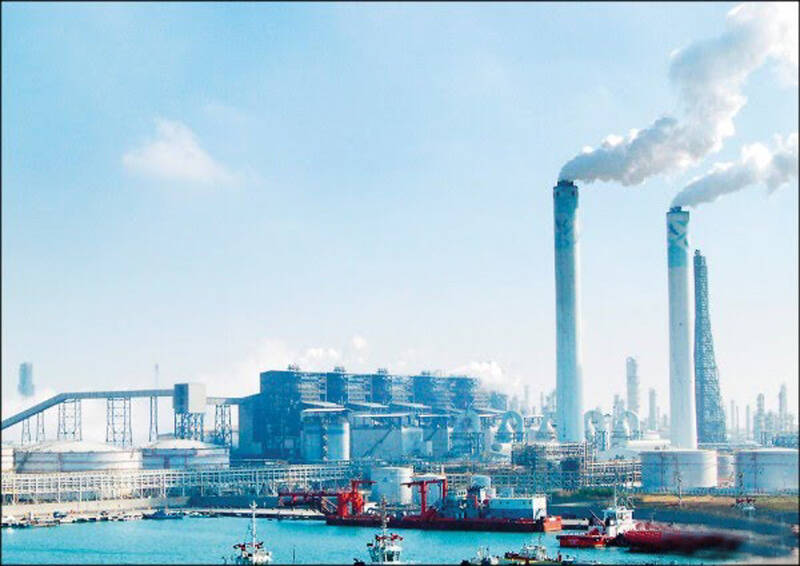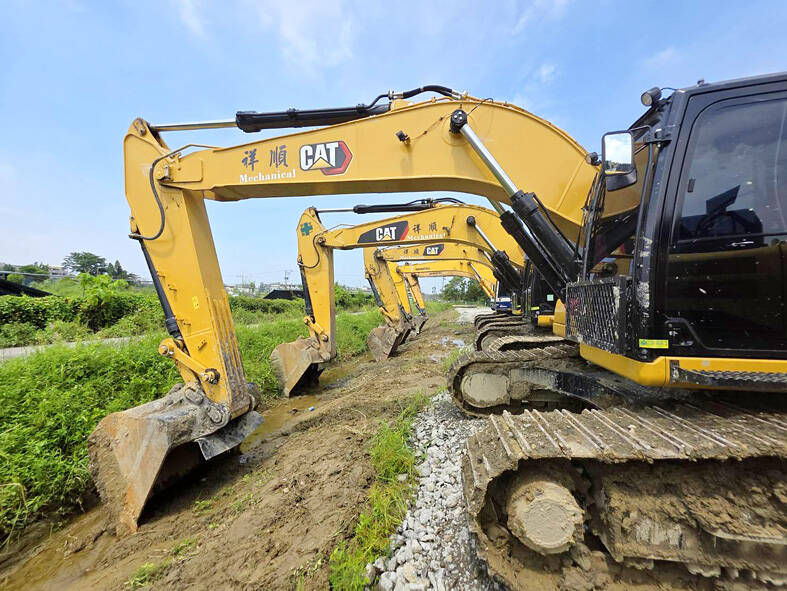Last week the story of the giant illegal crater dug in Kaohsiung’s Meinong District (美濃) emerged into the public consciousness. The site was used for sand and gravel extraction, and then filled with construction waste. Locals referred to it sardonically as the “Meinong Grand Canyon,” according to media reports, because it was 2 hectares in length and 10 meters deep. The land involved included both state-owned and local farm land.
Local media said that the site had generated NT$300 million in profits, against fines of a few million and the loss of some excavators.
OFFICIAL CORRUPTION?

Photo courtesy of the Ciaotou District Prosecutor’s Office
The site had been seized in March of this year, according to the Chinese-language United Daily News, with fines issued previously in January. However, the prosecutor’s office launched an investigation only last month, suggesting that the site had continued operations. Indeed, a local Chinese Nationalist Party (KMT) politician said that she had been alerted to it by complaints from locals in July, though critics noted that she waited until after the investigation to appear at the site.
It is difficult to imagine how this site was able to function without official corruption. Land development is widely monitored by satellite. A few years ago a friend of mine hung a tarp over his picnic table on the east coast and the land office had people out within days to see what his “illegal structure” was. They had spotted the tarp on a satellite image. Moreover, the local Economic Development Bureau said that since 2022 it had found numerous pits in the Meinong area backfilled with construction waste, meaning that its officials were criss-crossing the area. Residents had long complained about the noise and damage caused by the machinery and trucks. The complaints, like so many others, had fallen on deaf ears.
Last week also saw another round in the ongoing struggle over water supplies to the subsidy-guzzling, tariff-protected Mailiao Industrial Complex in Yunlin, operated by Formosa Plastics. The ostensible policy goal of the massive petrochemical complex was to make Taiwan self-sufficient in petrochemical products.

Photo: TT file photo
The government originally intended that the site was to develop its own independent water supply, but that was never carried out. Instead, for 30 years the petrochemical plants have drawn 100 million tons of water annually from the Jhuoshuei River (濁水溪), at prices of around a third of normal water market prices (the entire Hsinchu science park demands around 52 million tons of water annually).
Furthermore, as a nifty discussion of the issues at News and Market observes, the government also poured millions of taxpayer dollars into constructing the Jiji Weir (集集攔河堰) in Nantou County and its associated pipelines for Mailiao, which it then uses to provide the company below-cost water.
The ruthless plundering of the river’s water to subsidize the complex has forced local farmers to mine groundwater, even though the river no longer replenishes local aquifers. This results in large-scale subsidence in the area (13 of 20 townships have subsidence problems), and the burning of fossil fuels to drive the pumps. Though it has no water rights during the dry season from February to May, it continues to draw water from the river, purchased from the Ministry of Economic Affairs’ Bureau of Industrial Parks.

Photo courtesy of the Ciaotou District Prosecutor’s Office
By law, farmers have the highest water priority. A 2016 journal article on water use per capita in Yunlin observed that “Yunlin County faces more water resource-related difficulties than any other county in Taiwan.”
A desalination plant to supply the petrochemical complex is supposed to begin operation this month. It had been slated for completion in 2022, but Formosa Plastics asked for three extensions until April next year. The company was fined a pitiful NT$300,000 by the Ministry of Environment. However, environmental groups remain skeptical that the plant will generate the planned 100,000 tons of water per day, and accuse Formosa Plastics of dragging its feet in constructing the facility. They also point out that as long as the plant can obtain cheap water from the river, it has no incentive to complete the desalination facility.
Finally, last week environmental groups also criticized the Ministry of Environment after it released the list of newly appointed Environmental Impact Assessment (EIA) committee members. Of the 14 appointees, half of whom were carried over from the previous term, nine have an environmental engineering background, and one has a background in ocean engineering, Air Clean Taiwan founder Yeh Guang-perng (葉光芃) observed in a Taipei Times report. Only two of the appointees had backgrounds in ecology, the fewest in committee history, Taiwan Academy of Ecology director Yang Kuo-cheng (楊國禎) added. The groups also complained that several of the appointees were known for backing controversial projects and turning a deaf ear to complaints.
The common thread to all these stories is the same: official indifference to environmental destruction, apparent collusion between businesses and government, especially local government, and minimal or complete evasion of oversight by firms. All over long periods of time, across different administrations and political parties. Anyone who reads the news can see that the Democratic Progressive Party (DPP) has largely continued, rather than ended, longstanding extractive policies that originated under the KMT.
The people who live with this government-approved and facilitated looting of local wealth and resources are largely residents of long-time DPP areas. Yunlin is a DPP fief. The reason the south is pan-Green is because during the years of KMT rule it was treated as a colony of Taipei, its resources extracted and the wealth of its farmers transferred to the KMT government. Indeed, former president Lee Teng-hui’s (李登輝) doctoral thesis in agricultural economics at Cornell explores the extractive agricultural policies of the KMT government and presents an implicit critique of its rule as even more extractive than Japanese colonial rule. The result has been two generations of farmers in the south who don’t vote KMT at the national level.
LOSING VOTERS
All that could easily be lost. Why did the DPP see many longtime voters switching to the Taiwan People’s Party (TPP) in the last election? It has become a center-right establishment party in cahoots with business. The list of appointees to the EIA committee mentioned above are a formal signal of its commitment to big business.
Another nine-in-one election is inbound. It should be obvious that the DPP needs to swing back towards the combination of social justice and economic nationalism that drove the party’s incorporation of voters for two decades after 1996. If the DPP wants to remain in power, it needs to go back to its roots.
Even more urgently, the People’s Republic of China (PRC) threat looms. Recent research by Wu Wen-chin (吳文欽) of the Academia Sinica Institute of Political Science shows that as Taiwan’s income inequality worsens, citizens’ willingness to fight for the nation declines.
The DPP’s rightward drift is impairing the party’s ability to win elections by chasing off voters, while reducing Taiwanese’ attachment to their country. Not just bad politics, it is a threat to the nation’s security.
Notes from Central Taiwan is a column written by long-term resident Michael Turton, who provides incisive commentary informed by three decades of living in and writing about his adoptive country. The views expressed here are his own.

The Lee (李) family migrated to Taiwan in trickles many decades ago. Born in Myanmar, they are ethnically Chinese and their first language is Yunnanese, from China’s Yunnan Province. Today, they run a cozy little restaurant in Taipei’s student stomping ground, near National Taiwan University (NTU), serving up a daily pre-selected menu that pays homage to their blended Yunnan-Burmese heritage, where lemongrass and curry leaves sit beside century egg and pickled woodear mushrooms. Wu Yun (巫雲) is more akin to a family home that has set up tables and chairs and welcomed strangers to cozy up and share a meal

Dec. 8 to Dec. 14 Chang-Lee Te-ho (張李德和) had her father’s words etched into stone as her personal motto: “Even as a woman, you should master at least one art.” She went on to excel in seven — classical poetry, lyrical poetry, calligraphy, painting, music, chess and embroidery — and was also a respected educator, charity organizer and provincial assemblywoman. Among her many monikers was “Poetry Mother” (詩媽). While her father Lee Chao-yuan’s (李昭元) phrasing reflected the social norms of the 1890s, it was relatively progressive for the time. He personally taught Chang-Lee the Chinese classics until she entered public

Last week writer Wei Lingling (魏玲靈) unloaded a remarkably conventional pro-China column in the Wall Street Journal (“From Bush’s Rebuke to Trump’s Whisper: Navigating a Geopolitical Flashpoint,” Dec 2, 2025). Wei alleged that in a phone call, US President Donald Trump advised Japanese Prime Minister Sanae Takaichi not to provoke the People’s Republic of China (PRC) over Taiwan. Wei’s claim was categorically denied by Japanese government sources. Trump’s call to Takaichi, Wei said, was just like the moment in 2003 when former US president George Bush stood next to former Chinese premier Wen Jia-bao (溫家寶) and criticized former president Chen

President William Lai (賴清德) has proposed a NT$1.25 trillion (US$40 billion) special eight-year budget that intends to bolster Taiwan’s national defense, with a “T-Dome” plan to create “an unassailable Taiwan, safeguarded by innovation and technology” as its centerpiece. This is an interesting test for the Chinese Nationalist Party (KMT), and how they handle it will likely provide some answers as to where the party currently stands. Naturally, the Lai administration and his Democratic Progressive Party (DPP) are for it, as are the Americans. The Chinese Communist Party (CCP) is not. The interests and agendas of those three are clear, but